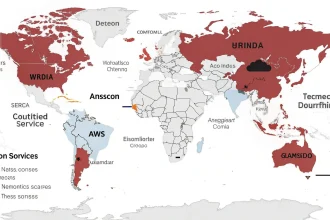Stockton Council has begun testing artificial intelligence systems to enhance its public services, focusing on fraud detection and predicting social care requirements for residents. The initiative marks a significant step in the local authority’s efforts to modernize operations and improve efficiency.
The council is implementing AI technology to identify potential cases of fraud more effectively, allowing for quicker intervention and protection of public funds. Simultaneously, the social care forecasting system aims to anticipate community needs, potentially enabling better resource allocation and more timely support for vulnerable residents.
Fraud Detection Capabilities
The AI fraud detection system being tested in Stockton analyzes patterns and anomalies in data that might indicate fraudulent activity. This technology can process vast amounts of information much faster than traditional manual methods, flagging suspicious transactions for human review.
By implementing these tools, the council hopes to reduce financial losses from fraud while directing resources more efficiently. The system works by establishing baseline patterns of normal activity and identifying deviations that warrant investigation.
Forecasting Social Care Needs
Perhaps the most innovative aspect of Stockton’s AI trial involves predictive analytics for social care planning. The technology examines historical data and current trends to forecast future demand for various social services.
This approach could help the council:
- Allocate staff and resources more effectively
- Prepare for seasonal or demographic changes in service needs
- Identify emerging social care issues before they become critical
The forecasting tools analyze factors such as population demographics, historical service usage, and even weather patterns that might affect care needs among vulnerable populations.
Balancing Technology and Human Oversight
While the council embraces these technological tools, officials emphasize that AI systems serve as decision support rather than replacement for human judgment. Social workers and fraud investigators maintain oversight of all AI-generated recommendations.
The trial includes careful evaluation of the technology’s accuracy, with regular reviews to ensure the systems perform as expected. Council representatives note that all AI implementations comply with data protection regulations and ethical guidelines for public service technology.
“We’re looking at how these tools can help us work smarter, not replace the essential human element of our services,” a council spokesperson explained.
The Stockton initiative reflects a growing trend among local authorities seeking technological solutions to address budget constraints while maintaining or improving service quality. Similar programs have been implemented in councils across the UK, though Stockton’s combined approach to both fraud detection and social care forecasting represents a more comprehensive strategy.
Results from the trial will determine whether the council expands AI use to other service areas. Early indicators suggest potential cost savings in fraud prevention and more responsive social care planning, though full evaluation will take place after the trial period concludes.
As local governments face increasing pressure to deliver more with limited resources, Stockton’s AI experiment may provide valuable insights for other councils considering similar technology adoption. The balance between innovation and responsible implementation will likely determine the long-term success of such initiatives.









